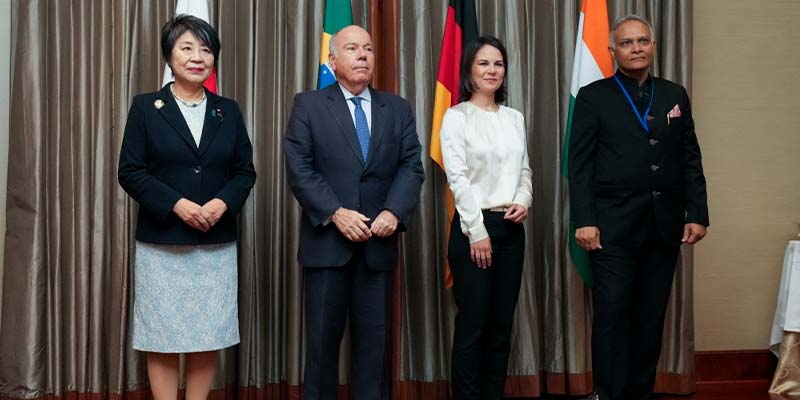- India
- Sep 23
What is the purpose of G4 nations?
• The Foreign Ministers of the G4 countries met on the margins of the 78th Session of the United Nations General Assembly, to discuss the state of play of the negotiations for the reform of the UN Security Council.
• Secretary (West), Ministry of External Affairs Sanjay Verma, Foreign Minister of Brazil Mauro Vieira, Federal Foreign Minister of Germany Annalena Baerbock, Minister for Foreign Affairs of Japan Yoko Kamikawa met on the margins of the 78th Session of the United Nations General Assembly.
• The ministers reiterated that the expansion of the UN Security Council in both permanent and non-permanent categories of membership is essential to make the body more representative, legitimate, effective and efficient.
• They emphasized the importance of forthcoming milestone events, such as the Summit of the Future in 2024 and the UN 80th anniversary in 2025, for decisive progress and tangible results on Security Council reform.
Who are the G4 members?
• The G4 is a grouping of Brazil, Germany, India and Japan which are aspiring to become permanent members of the United Nations Security Council (UNSC).
• The G4 countries are supporting each other’s bids for permanent membership of the UNSC.
• All the four countries have been figured among the elected non-permanent members of the council since the UN’s establishment.
• The G4 nations traditionally meet on the sidelines of the annual high-level UN General Assembly session.
• At present, the UNSC comprises five permanent members and 10 non-permanent member countries which are elected for a two-year term by the General Assembly of the United Nations. The five permanent members are Russia, the UK, China, France and the United States and these countries can veto any substantive resolution.
• The government of India has been according highest priority to obtain a permanent membership for India in an expanded United Nations Security Council. Towards this end, the government has undertaken various initiatives aimed at building international support for India’s case.
• The matter has been consistently taken up during bilateral and multilateral meetings, and in discussions with other countries at all levels.
• There is however a group of countries which is opposed to any expansion in the permanent category of membership, and calls for consensus to be arrived at for any reforms in the Security Council.
• Given the diversity of opinion on the nature and scope of UNSC reforms and the varied positions of different regional groupings on this matter, it remains under active discussion.
Manorama Yearbook app is now available on Google Play Store and iOS App Store

